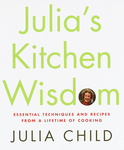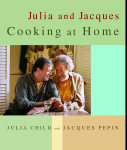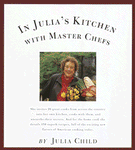The Story of "Mastering" at Knopf
by Judith Jones
In June of 1960 a hefty manuscript--a treatise on French cooking by an
American woman, Julia Child, and two French ladies, Simone Beck and
Louisette Bertholle--landed on my desk. I had been an editor at Knopf
for about three years, working primarily on translations of French
books. But it was no secret that I had a passion for French cooking, so
I was the logical person to read it.
The manuscript had been sent down from Cambridge by Avis de Voto, who
worked as a scout for the Knopfs. She was the wife of the historian and
writer Bernard de Voto, who had had a lively transatlantic
correspondence with Julia on the subject of knives as a result of a
piece he had done in The Atlantic Monthly. Avis soon became involved
when she heard that Julia was working on a cookbook in Paris with
Mesdames Beck and Bertholle, and she offered to try to find an American
publisher. Her first submission met rejection, the publisher's comment
being, Why would any American want to know this much about French
cooking?
Well, it so happened that I did. As I turned the pages of this
manuscript, I felt that my prayers had been answered. I had lived in
Paris for three and a half years--at just about the same time the Childs
were there, although our paths had never crossed--and most of what I
learned then about cooking I absorbed from the butcher, the baker, the
greengrocer, and the fishmonger. I would ask questions of them all, and
then back in my tiny kitchen I would try to remember what the butcher's
wife had told me about making frites or the poissonière about sautéing a
dorade.
When I returned to the States, I realized how totally inadequate the few
books that dealt with French food really were. They were simply
compendiums of shorthand recipes and there was no effort to instruct the
home cook. Techniques were not explained, proper ingredients were not
discussed, and there was no indication in a recipe of what to expect and
how to rectify mistakes. So the home cook, particularly an American home
cook, was flying blind.
Yet here were all the answers. I pored over the recipe, for instance,
for a beef stew and learned the right cuts of meat for braising, the
correct fat to use (one that would not burn), the importance of drying
the meat and browning it in batches, the secret of the herb bouquet, the
value of sautéing the garnish of onions and mushrooms separately. I ran
home to make the recipe--and my first bite told me that I had finally
produced an authentic French boeuf bourguignon--as good as one I could
get in Paris. This, I was convinced, was a revolutionary cookbook, and
if I was so smitten, certainly others would be.
Below is the report I wrote at the time on "The French Cookbook," which
I hoped would convince the Knopfs that this book would be a credit to
their imprint. I also enlisted the help of a senior colleague, Angus
Cameron. He had been an editor at Bobbs-Merrill when Joy of Cooking was
published and he loved to say that he had enough larceny in his soul to
know just how to pitch a book. So his report, I'm convinced, did the
trick (also included is his final paragraph).
The rest is history. In the fall of 1961 we published Mastering the Art
of French Cooking (incidentally, Alfred Knopf, when I told him the title
we had settled on, said if anyone would buy a book by that title, he
would eat his hat), and after Craig Claiborne pronounced the book a
classic, the book went into a second printing before Christmas. Of
course, when Julia went on television the following summer as the French
Chef all of America fell in love with her. But everything she taught on
camera was grounded in this seminal book--understand what you are
cooking, do it with care, use the right ingredients and the proper
equipment, and, above all, enjoy yourself.
Judith Jones
Senior Editor
--excerpted from the Introduction to the 40th Anniversary Edition of Mastering the Art of French Cooking
Report on French Cookbook by Julia Child, Simone Beck, and Louisette Bertholle
I've had this French cookbook for Americans for almost two months now,
have read it through, tried innumerable recipes, some simple and some
challenging, and I think it's not only first-rate but unique. I don't
know of another book that succeeds so well in defining and translating
for Americans the secrets of French cuisine. The reason? Because the
authors emphasize technique--not the number of recipes they can cram
into a volume, nor the exotic nature of the dishes. Reading and studying
this book seems to me as good as taking a basic course at the Cordon
Bleu. Actually it's better than that because the authors' whole focus is
on how to translate the tricks learned to the problems that confront you
at home (i.e., the differences in meat cuts, utensils, materials). It is
not a book for the lazy but for the cook who wants to improve, to take
that giant step from fair-to-good accomplishment to that subtle
perfection that makes French cooking an art. I swear that I learned
something from this manuscript every few pages.
As to recipes, they have very intelligently selected the dishes that are
really the backbone of the classic cuisine. (Attached is the table of
contents.) The approach is to introduce the general subject first: what
to look for in buying, best utensil to use, timing, testing for
doneness, tricks to improve. Then there is usually a master recipe,
presented in painstaking detail, followed by variations, different
choices of sauces for embellishing the same dish. There is a good deal
of text devoted not to cuisine lore but to practical detail; you are
seldom directed to do something without being told why. The authors are
perfectionists, opinionated, and culinary snobs in the best sense--that
is, they will approve of a frozen short cut, when time demands it, but
they tell you how to add some tastiness to the packaged good. They also
give of themselves; their dos and don'ts are not arbitrary but they
stress that their method is one that they have arrived at through
experimentation.
Finally, I do not believe that this book will in any way hurt others,
such as Donon's Classic French Cuisine, on our list. The fact is that it
enhances other French cookery books because one can apply techniques
learned in it in order to use effectively the recipes offered so
sketchily, by comparison, in all the other books, and it should be so
promoted. I think this book will become a classic.
Judith B. Jones
From the archives: Reader's Reports from Judith Jones and Angus Cameron, 1960
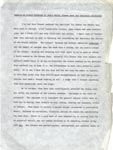
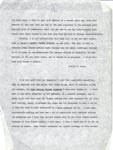
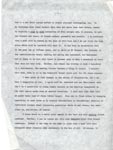
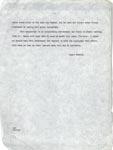
Click images to view larger
Angus Cameron's Report:
I am very glad that you suggested I read this remarkable manuscript.
Both as aspirant cook and editor this seems to me, short of actually
trying the recipes, the best working French cookbook I have ever looked
at. I think back to the early promotion on the Rombauer, as a general
cookbook, and it seems to me that this does for French cooking what that
cookbook did for standard cooking, namely to present the steps and the
processes in such a way as to make the book as near fool-proof as a good
cookbook can be. I have done considerable cooking and have had a lot of
experience with cookbook editing and promotion and I know that on both
counts this is the first really useable cookbook of fine French cookery
I have seen. I know I would use it to the exclusion of others. Many
French cookbooks are really catalogs of fine recipes and in a way their
recipe method is almost straight cataloguing, too. To my knowledge what
these authors have done has never been done before, namely to organize a
step by step collection of fine recipes and, in process, to make the
climate and theory of French cookery graspable and useable. I am
convinced that a path will be beaten to the door of this book and I do
not think the high price which will be involved will hurt it. It has
been my observation that in the past ten or fifteen years, and in spite
of TV dinners, the interest in and sophistication about, cooking and
eating has increased, not decreased. And it seems to me that this trend
is present also in many a household of taste that does not have help.
Further, and almost any kitchen in such a household is a testimonial,
the cooking library becomes a thing in itself. I believe this book, done
by us in the beautiful format would sell for all these reasons.
I have given no real thought to the matter of illustration, but I do
have a suggestion or two. I agree with Mr. Koshland and you (Mrs. Jones)
that the 4 to 6 quantities is wrong simply because so few American
households do the full course meals even on special occasions. I feel
sure that four like me would leave some of those tables hungry. This can
be fixed either by changing quantities in some cases or by precise
instructions in introductory sections or individual recipes about
increasing quantities which is not always, but sometimes is, one-to-one,
of course.
I think there is a solid sales appeal in the best and only working
French cookbook. Further, I see no reason why this need denegate [sic;
negate? denigrate?] other fine French cookbooks. Indeed in our copy we
can make it clear that a book like this alongside other classics adds
enormously to the use of all. Of course, it would stand alone as the
only one needed, but we need not injure other French cookbooks by making
that point exclusively.
This manuscript is an astonishing achievement and there is simply
nothing like it. Cooks will know this by word of mouth very soon, I'm
sure. I think we should have this confidence and venture it with the
knowledge that others will have to look to their laurels when this one
is available.
Angus Cameron
|


